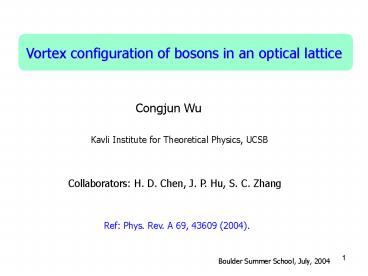Vortex configuration of bosons in an optical lattice PowerPoint PPT Presentation
Title: Vortex configuration of bosons in an optical lattice
1
Vortex configuration of bosons in an optical
lattice
Congjun Wu
Kavli Institute for Theoretical Physics, UCSB
Collaborators H. D. Chen, J. P. Hu, S. C. Zhang
Ref Phys. Rev. A 69, 43609 (2004).
Boulder Summer School, July, 2004
2
Motivation (I) vortices in rotating traps
- Topological defect of the superfluid (SF)
order parameter.
Time of flight image
Weak coupling vortex particle density is
suppressed in the core.
SF order
density
P. Engels, et al. PRL. 89, 100403 (2002)
3
Motivation (II) SF- Mott-Insulator transition
Superfluid
Mott insulator
M. Greiner et al., Nature (London) 415, 39
(2002).
- How about the vortex near the SF-Mott insulator
(MI) transition?
4
Rotating optical lattice through holographic
method
S. Tung, V. Schweikhard, and E. A. Cornell,
cond-mat/0607697
5
Vortex pinning to the lattice potential
- Weak optical potential, square optical lattice.
- How about in the strong coupling limit (near
SF-MI) transition?
S. Tung, V. Schweikhard, and E. A. Cornell,
cond-mat/0607697
6
Bosons in optical lattices without rotation
- Lobes of commensurate MI phases.
- Particle-like, hole-like, and particle-hole
symmetric SF phases.
N2.05
N2.00
M. P. A. Fisher et al., Phys. Rev. B 40, 546
(1989).
N1.95
7
Superfluid vortex with nearly Mott-insulating
core
(t/U0.02)
ltNgt1.95
ltNgt2.05
C. Wu , et al., Phys. Rev. A, 69, 43609 (2004)
cond-mat/0211457.
8
Bosons in rotating optical lattices
- Vector potential for Coriolis force
- Neglect the trapping potential and the
centrifugal potential. - Josephson junction array in the magnetic field
at low temperatures.
9
Mean field approximation Guzwiller
- Decouple to single site problems
- The MF ground state wavefunction
- The spatially dependent SF order
- Valid at the small t/U.
10
Competition between SF and MI phases
- teff/U is frustrated as approaching
- the vortex core
- vortex core is more strongly
- correlated than the bulk area.
- superfluid vortex with
- Mott-insulating core.
11
Evolution of the vortex particle density
distribution
- Core particle density approaches the nearest
integer number.
- Vortex core with maximum particle density in the
hole-like case.
- Real space superfluid-Mott phase transition.
12
Evolution of the vortex particle density
distribution
13
Strong to weak coupling vortex configuration
- Particle density profile along a cut passing the
central plaquette.
t/U
ltNgt1.95
14
Phase diagram with next nearest repulsion
- Charge density wave (CDW) and Super-solid phases
appear at the half-integer - filling and small t/U.
- Map to the spin 1/2 Heisenberg model with the
Ising or XY anisotropy.
15
Vortex with the CDW core (meron)
- W/U0.1, t/U0.023 and ltNgt1.5.
- Similar to the antiferromagnetic vortex core in
underdoped - high Tc superconductors.
16
Possible experiments
- Vortex core size on the optical lattice is about
2 microns. - Focus the probe laser beam to this size and
scan the lattice to - determine the particle density
distribution. - Raman photon-association to detect the percentage
of Mott region. (D. J. Heinzens group) - The Josephson junction array system in the
magnetic field. From the electrical field
distribution, it is possible to determine the
vortex charge.
17
Summary
- The vortex core is a more strongly coupled region
compared to - the bulk area.
- Near the SF-MI transition, the vortex core is
nearly Mott insulating and the core particle
density approaches the nearest commensurate
value. - As t/U increases, the vortex evolves from the
strong coupling configuration to weak
coupling one.

